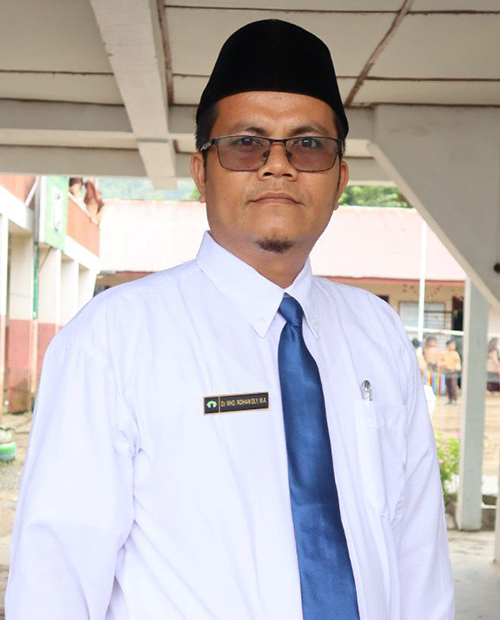Application of Socio-Drama Method to Improve Learning Outcomes in Honest Behavior and Keep Promises in Grade IX Students of SMP Negeri 3 Saipar Dolok Hole, Saipar Dolok Hole District
Keywords:
Socio-drama method, Learning outcomes, Honest behavior, Keeping promises, Character learningAbstract
This study aims to analyze the effectiveness of the application of socio-drama methods in improving student learning outcomes in honest behavior and keeping promises in grade IX of SMP Negeri 3 Saipar Dolok Hole, Saipar Dolok Hole District. The socio-drama method was chosen because it allows students to understand the material more deeply through hands-on experience in situations that resemble real life. This study uses a classroom action approach (PTK) with two cycles that include planning, implementation, observation, and reflection stages. The subject of the study is a grade IX student of SMP Negeri 3 Saipar Dolok Hole. Data was collected through learning outcome tests, observation of student activities, and interviews with teachers and students. Data analysis was carried out in a quantitative and qualitative descriptive manner to measure the improvement of learning outcomes and changes in students' attitudes towards honest behavior and keeping promises. The results of the study show that the socio-drama method can significantly improve student learning outcomes. The average score of students increased from 65.2 on the initial test to 81.5 after the application of this method. In addition, students become more active in learning, better understand the concepts of honesty and responsibility, and show positive changes in daily attitudes. Teachers also feel the benefits of this method in building student engagement and creating a more interactive learning atmosphere. Thus, the application of the socio-drama method has proven to be effective in improving students' understanding and learning outcomes on honest behavior and keeping promises. This study recommends that this method be applied more widely in the learning of character values in junior high school.References
Arends, R. I. (2014). Learning to Teach (9th ed.). New York: McGraw-Hill Education.
Bahri, S., & Zain, Z. (1995). Metode Sosiodrama dalam Pembelajaran. Jakarta: Penerbit
Pendidikan.
Collier, P., & Fishman, B. (2002). The Role of Education in Shaping Social Attitudes: Bridging
Theory and Practice. Cambridge: Harvard University Press.
Dufresne, R. J., & Mestre, J. P. (2005). Problem Solving and the Learning of Physics. Journal of
Research in Science Teaching, 42(5), 446-463.
Gagne, R. M. (1985). The Conditions of Learning (4th ed.). New York: Holt, Rinehart & Winston.
Hamalik, O. (2004). Proses Belajar Mengajar. Jakarta: Bumi Aksara.
Hamalik, Oemar . 2003. Proses Belajar Mengajar. Jakarta : Bumi Aksara.
Joesoef, S. (2001). Sosiodrama untuk Pembelajaran Sosial. Jakarta: Balai Pustaka.
Kusumah, Wijaya dkk. 2012. Penelitian Tindakan Kelas. Jakarta: PT. Indeks.
Morgan, C. T. (2000). Introduction to Psychology (6th ed.). New York: McGraw-Hill.
Munir, M. (2009). Media Pembelajaran: Merancang dan Mengembangkan Media Pembelajaran
yang Efektif. Bandung: Alfabeta.
Munjih, A. (2009). Metode Pembelajaran Sosiodrama dalam Meningkatkan Kepribadian Siswa.
Yogyakarta: Pustaka Pelajar.
Nasih, A. M. (2009). Penerapan Sosiodrama dalam Pembelajaran. Yogyakarta: Pustaka Pelajar.
Nasih, Ahmad Munjin dkk. 2009. Metode dan Teknik Pembelajaran Pendidikan Agama Islam.
Bandung : Refika Aditama.
Nasution, S. (2003). Dasar-Dasar Proses Belajar Mengajar. Jakarta: Bumi Aksara.
Santoso, S. (2000). Psikologi Pendidikan dan Sosial: Pendekatan Terhadap Pembelajaran Sosial.
Jakarta: Penerbit Gramedia.
Santrock, J. W. (2011). Educational Psychology (5th ed.). New York: McGraw-Hill.
Sardiman, A. M. (2011). Interaksi dan Motivasi Belajar Mengajar. Jakarta: Rajawali Press.
Skinner, B. F. (1953). Science and Human Behavior. New York: Macmillan.
Slameto. 2010. Belajar dan faktor-faktor yang mempengaruhi. Jakarta : Rineka Cipta.
Soelaiman, J., & Santoso, S. (2002). Sosiodrama dalam Pendidikan: Teori dan Praktik. Jakarta:
Penerbit Pendidikan.
Sudjana, N. (2009). Metode Pembelajaran yang Efektif. Bandung: Sinar Baru Algensindo.
Sudjana.2005. Strategi Pembelajararan.Bandung :Falah Production.
Sumiati, & Asra, A. (2002). Pendidikan Sosial dalam Pembelajaran: Teori dan Aplikasi. Bandung:
Remaja Rosdakarya.
Tobroni ,M, dan Mustofa A.2013.Belajar dan Pembelajaran.Yogjakarta: Ar-Ruzz Media.
Woolfolk, A. (2014). Educational Psychology (12th ed.). Boston: Pearson.
Downloads
Published
How to Cite
Issue
Section
License

This work is licensed under a Creative Commons Attribution-ShareAlike 4.0 International License.









